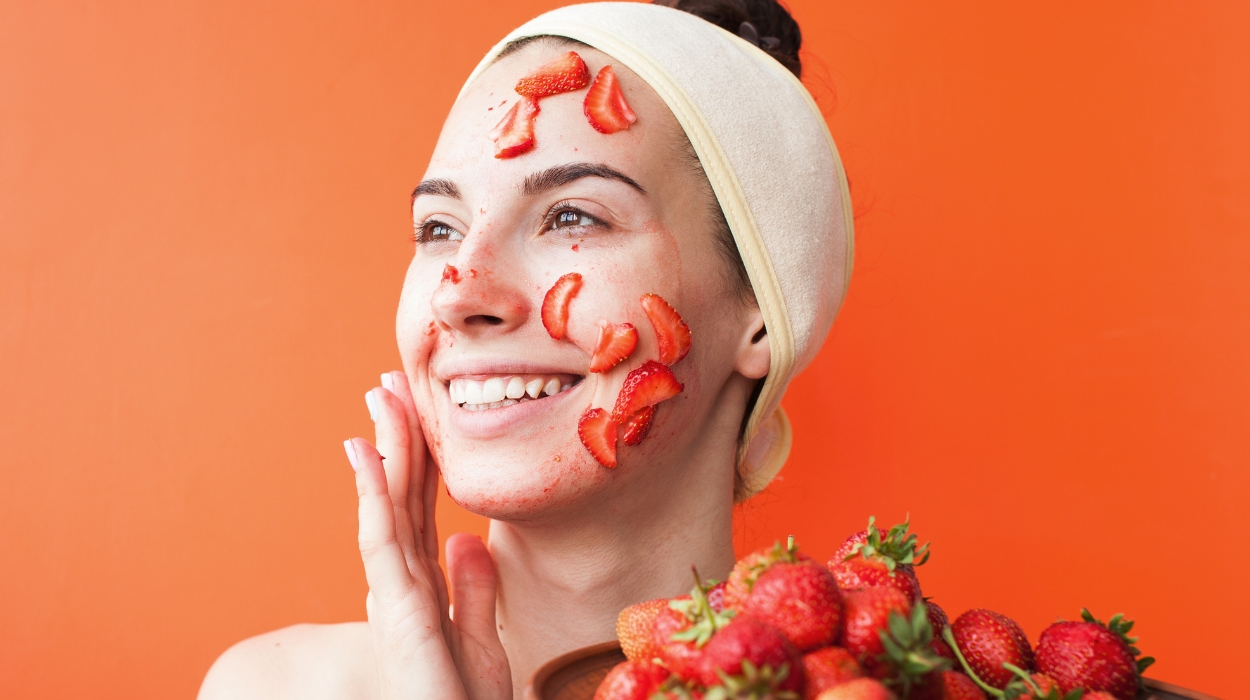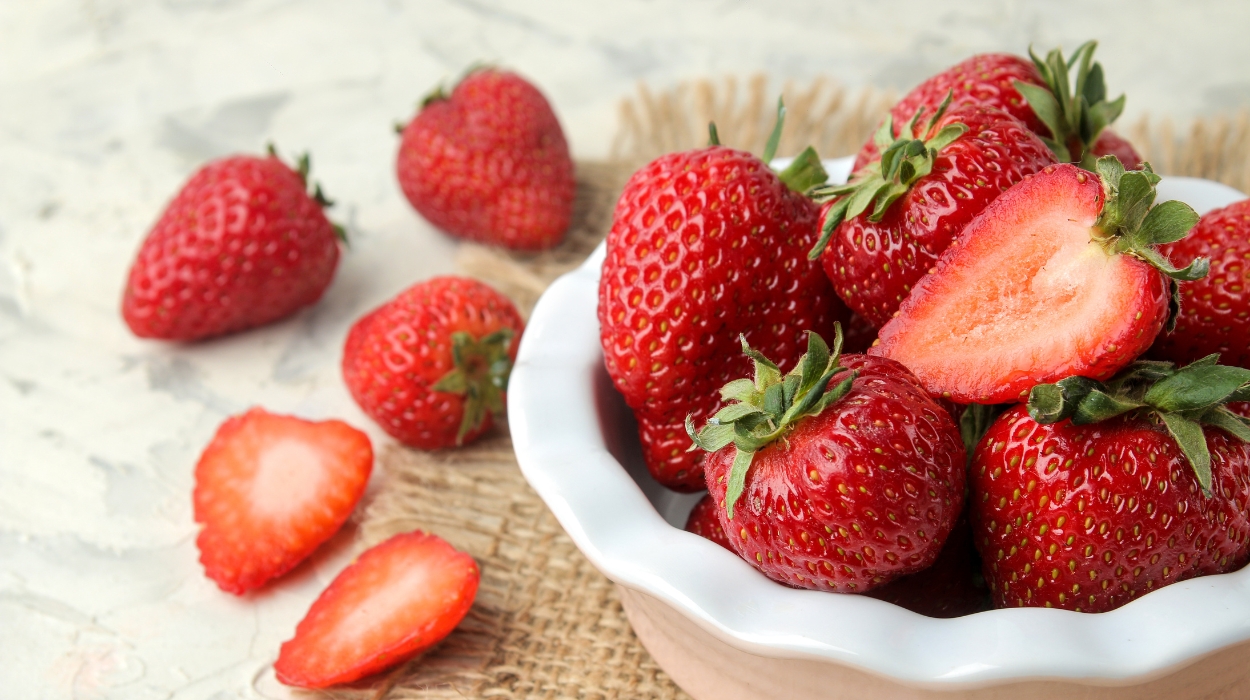Like most berries, fresh strawberries are well-known to contain plenty of antioxidants. Antioxidants[1] prevent harm caused by free radicals, which are a natural byproduct of metabolism. In particular, antioxidants have anti-inflammatory properties, which may help you thwart many chronic diseases.
Yet, these benefits can extend to your skincare routine as well. So, are these healthy fruits worth including in your diet? What exactly are the benefits of strawberry for skin health and appearance?
In this article, we explore the health benefits of strawberries for the skin. We also take a look at different methods to use strawberries for your skin (hint: It’s not just about strawberry consumption).
What Benefits Strawberries Can Bring To Your Skin?
Strawberries can benefit the skin in multiple ways, including:
- Aiding skin repair.
- Reducing signs of aging.
- Brightening the skin.
- Reducing acne and blemishes.
- Improving hydration.
- Helping with exfoliation of the skin.
Benefits Of Strawberry For Skin

Strawberries offer a slightly sweet and tart flavor that appeals to many. But this natural sweet treat may also improve skin texture and more. So, if you already love strawberry picking each year, here are a few more reasons to add this activity to your annual traditions.
Below, we explore multiple skin benefits of strawberries — and even how you might be able to use this juicy fruit as an acne treatment.
Aids In Skin Repair
One cup of sliced strawberries[2] contains almost 98 milligrams of vitamin C, which is well above the recommended daily amount.[3] In other words, one cup of strawberries a day gets you more than enough vitamin C without any adverse side effects.
Research suggests that improved nutritional intake of vitamin C can benefit overall skin health.[4] Vitamin C is thought to contribute to:
- Increased collagen production.
- Decreased free radicals, particularly after exposure to environmental pollutants and UV rays.
- Enhanced wound healing.
- Regenerate healthy skin.
In turn, this can improve skin appearance and health. So, consider indulging in strawberries as a healthy snack or even in strawberry pie. It’s worth it for the vitamin C content alone.
Reduces Signs Of Aging
Today, many of us are continually looking for answers to unlock the fountain of youth. For some, this may mean consuming the best green powders or fruit and vegetable supplements. After all, most of us know that the maintenance of youth starts from within, including our diet.
Yet, whether we aim to prevent wrinkles or improve them, strawberries might help. These anti-aging benefits primarily arise once again from vitamin C.
Research indicates that topical vitamin C application has many anti-aging effects.[5] It may help protect against photoaging and may increase collagen synthesis, reduce collagen degradation, and prevent pigmentation.
All of the above can reduce signs of aging in the skin, yet it’s worth noting that these studies involved topical use. This suggests that strawberries might be beneficial not only in your diet but also as part of your skincare routine.
May Brighten The Skin
It’s thought that the application of strawberry extract containing vitamin C may help reduce under-eye puffiness and brighten the skin. A recent scientific study showed that vitamin C acted as a skin-brightening agent and had anti-aging effects.[6]
However, note that this study combined vitamin C with vitamin E and raspberry leaf cell culture extract. Thus, more research focused specifically on vitamin C would help solidify these claims.
At the same time, other research shows that vitamin C can reduce dark spots through its depigmentation properties.[7] It’s no secret why many popular skin products use strawberry extract as an ingredient. As the evidence suggests, it might just leave you with more healthy and radiant skin.
Reduces Acne And Blemishes
Acne[8] is a chronic inflammatory disease. For those that suffer from this condition, they experience unsightly blemishes, papules, nodules, and lesions. Yet, the antioxidants present in strawberries offer hope for many acne sufferers.
Since antioxidants lower inflammation, the antioxidants in strawberries may help reduce inflammation causing acne. At the same time, we are not saying that you should ignore the advice given to you by your dermatologist or doctor. Yet, the anti-inflammatory benefits provided by this fruit may complement other treatments you are using to achieve clearer skin.
Provides Hydration To The Skin
Strawberries[9] contain plenty of water. As you may already know, water is essential for optimal health and functioning. This also includes good skin health.
Research suggests that dietary water impacts skin hydration.[10] Since strawberries contain water, eating more may contribute to improved hydration. Thus, it may contribute to healthier and glowing skin.
May Provide Exfoliation
Strawberries are well-known amongst skin care enthusiasts for containing alpha-hydroxy acids or AHAs. AHAs act as an exfoliator for the skin by improving cell renewal rates.[11] In other words, they help remove dead skin cells and make room for new ones.
This means that this fruit can be an excellent exfoliator. However, this is only relevant when used for topical applications, which we’ll provide more about below.
Are Strawberries Good For Your Skin?
Yes. Strawberries offer multiple skincare benefits. This is why you’ll commonly find strawberries or strawberry extract in various skincare products.
They can enhance skin hydration, reduce dark spots, improve or prevent signs of aging, improve acne blemishes, and more. Overall, this can leave you with a more radiant complexion, helping you say goodbye to dry and dull skin.
However, eating strawberries isn’t the only way to enhance your skin. You can also use them in various topical applications, such as face masks and more.
How To Use Strawberries For Better Skin

There are many ways to use strawberries for better skin. Popular options include:
- Eating more fruit salads: This can help you obtain enough vitamin C from your diet, which could have benefits for your skin.
- Creating a strawberry face mask: There are many different ways to do this. Combining strawberries with olive oil, coconut oil, honey, apple cider vinegar, and other ingredients can offer the perfect at-home self-care routine.
- Making a strawberry scrub: Mashed strawberry and sugar, alongside olive or coconut oil, can be a great exfoliating addition to your skincare routine. However, be gentle. Scrubbing too hard with these at-home creations may cause more damage than good.
- Swap out cucumbers for strawberry eye covers: Start by chilling them in the fridge. Then, sit back and relax with a couple of slices of cool strawberries on your eyes to help de-puff.
- Make strawberry juice: With plenty of fiber and antioxidants, strawberry juice can offer a nutritious and refreshing daily beverage. Add it to your diet to kick a sugar craving or enjoy it alongside your favorite green powder.
Conclusion
Skincare magic lies within the use of natural products, like those containing strawberries. Even eating this tasty fruit improves skin health in various ways. Strawberry benefits for skin health include improved hydration, enhanced skin repair, reduced aging, and more.
So, try including more strawberries in your diet or add a DIY strawberry mask to your regular skincare routine. Perhaps this fruit is the piece missing in your journey toward healthier and more youthful skin.
Frequently Asked Questions
Strawberries provide various benefits for your skin. These include improved hydration, exfoliation, enhanced regeneration, anti-aging benefits, anti-inflammatory benefits, and more.
Yes, you can apply strawberries on your face daily. If using them as an exfoliator, however, be gentle. Rough scrubbing may damage the skin.
Strawberries and mangoes tend to take the top spot here. This is due to these delicious fruits containing plenty of beneficial vitamins and antioxidants. Antioxidants, in particular, can help prevent inflammation and damage to the skin.
Strawberries can contribute to healthier skin, improved immunity, better blood sugar management, and decreased inflammation. Overall, similar to the consumption of other fruits and vegetables, this can lead to better health.
Strawberries can improve collagen production, which may lead to more glowing and radiant skin. Their vitamin C and antioxidant contents also contribute to decreased inflammation, which can reduce redness and blemishes.
Yes, strawberries can improve the appearance of acne and even prevent flare-ups. This is largely due to their antioxidant content, which helps lower inflammation.
 Evidence Based
Evidence Based
